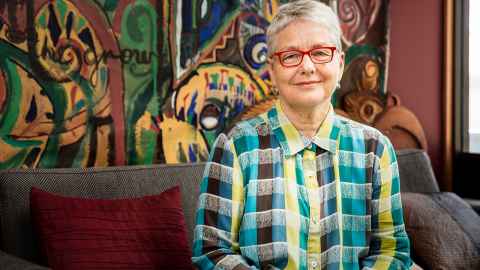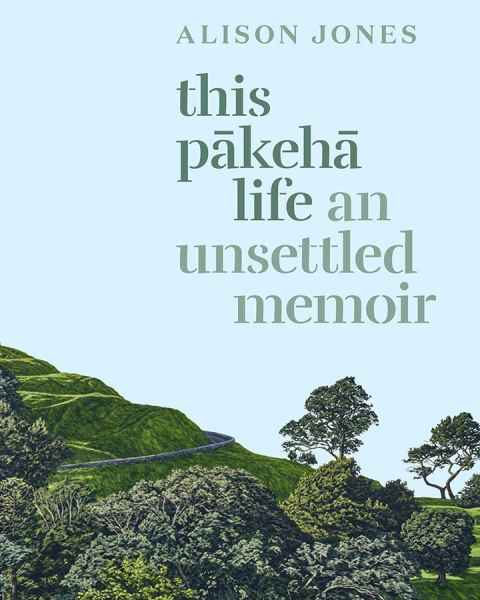Alison Jones: 'Pākehā shouldn't let our collective past be crippling'
2 September 2020
Educator and author Alison Jones has written a memoir that’s an insight into New Zealand’s social history and Māori and Pākehā relationships.

Professor Alison Jones’ first foray into academic study saw her become something of a minor expert on the mating behaviour of the mallard duck.
It was the early 1970s and she had given up on studying soil science for a Bachelor of Agricultural Science at Massey University after she realised the subject was better suited to young male farmers. She switched to science, despite her father telling her science was “a waste of time for a girl” and gained a BSc in 1974.
“But being a woman in science was not much fun in the 1970s,” she writes in This Pākehā Life: an Unsettled Memoir. (BWB, Released 8 September)
“I was dismayed at the profusion of white men in white coats (one of whom tried to seduce me); discouraged by the dearth of women lecturers and devastated when I was barred from applying for a coveted summer job overseeing a gannet colony at Cape Kidnappers simply because of my gender…”
Perhaps it was good fodder for Alison spending a lifetime exploring feminist theory, the sociology of education, and the complexities of Māori-Pākehā educational relationships.
Alison began teaching at the University of Auckland in 1978 as a tutor, and part of her role today involves running academic writing workshops at Te Puna Wānanga in the Faculty of Education and Social Work.
She is committed to writing well and her own efforts include He Kōrero: Words Between Us – First Māori Pākehā Conversations on Paper, in 2011, and the 2018 Ockham New Zealand Book Award winner Tuai: A Traveller in Two Worlds, with long-time friend and collaborator Professor Kuni Kaa Jenkins.
But Alison says writing a memoir tested her skills. “I’ve never written anything that’s so personal, self-revealing and so self-consciously oriented towards a popular readership,” she says. “But I always try to write in an accessible way, even in my more academic work. That’s what I try to get my students to do too.”
So how did the daughter of working-class British migrants, born in Auckland but who spent her formative years in Dannevirke, come to feel so comfortable – she says “comfortably uncomfortable” – with Māori culture?
That’s the journey travelled in her easy-read memoir, which despite dealing with some weighty topics in New Zealand social history, including the Springbok Tour and Māori land protests, feels relatable to many who grew up in the 1960s and 70s.
“I try to present the issues in a way that’s personal and anecdotal. I hope people see I’m trying things out.
“I’m not someone who’s got it all sorted and has written a book about how to live. Far from it!”
So many of us get stuck, either getting all defensive or trying to ignore the past. Or we try to make up for it for being by being a kind of humble ‘what can I do for you?’ type of Pākehā.
One thing she has got sorted is writing. Although she teaches academic writing to mainly Māori and Pacific education students, she teaches with the knowledge that writing skills are a critical part of every subject.
“My approach to academic writing is to make it straightforward, good writing. There are basic ways of writing that make it enjoyable to read but we don’t often encounter that in academic contexts.”
She says a lot of academic writing is simply bad writing.
“University teachers don’t give any serious attention to writing as a skill. Yet writing is what universities are all about. It doesn’t actually matter what you think or can say, everything has to be written down in the world of research.
“Writing is our primary task in a university, yet we are never told that we are writers and that writing is a very specific kind of skill.”
She says it’s assumed everyone knows how to write when we tell students to write essays. Unfortunately, they look at bad academic writing and mimic it, even if it’s impenetrable.
“Students who want to be scholars can be quite frightened of writing. They’ve not been trained to express themselves in a clear and logical way. I hear their wonderful ideas, but they don’t know how to write them well.”
Writing is our primary task in a university, yet we are never told that we are writers and that writing is a very specific kind of skill.
With that bugbear off her chest, it’s back to her memoir. Alison admits a couple of events she recalled while writing it ended up not being accurate when she contacted the old school friends involved.
“With memoir, all we can do is rely on what we have inside ourselves and that’s notoriously unreliable, though I try to report my memories faithfully”.
She says some writers call their memoirs fiction, even though they are mostly true, because they deliberately change some aspects to make the narrative more effective.
“I haven’t done that. But there are plenty of people from my past who’d say ‘well I don’t remember it like that’. But that’s okay. I don’t have a problem with that. The purpose of a memoir is to tell a particular story. It’s not an autobiography.”
This Pākehā Life reveals Alison’s mature reflections from a young age on Māori-Pākehā relationships, perhaps indicative of the path she was to take.
“I clearly recall various moments, such as when I was driving with my father and he told me Māori were letting their land go to rack and ruin.
"I have this memory of sitting there looking at all the gorse and wondering about ‘who is looking after it?’. And what does it have to do with Māori? I wanted to know.”
The book weaves social history through her friendships or connections made with the likes of Ripeka Evans, Donna Awatere Huata, Kuni Kaa Jenkins and William McCahon, son of Colin McCahon, with whom she had two sons, Finn and Frey McCahon Jones.
Despite her time spent traversing and immersing herself in the Māori world, and being embraced by it over time, Alison says there’s a sentiment in the book that still holds true today.
After encountering Māori activist Dun Mihaka arguing with a group of Pākehā male students, she writes in the memoir: “For the first time I witnessed Māori oratory and became aware of a raw Māori anger ... I felt Mihaka’s anger directly and took his accusations of Pākehā racism and destructive colonisation personally … I had an unnerving sense that Mihaka’s accusations were correct, but I could not bear to be the object of Māori criticism.”
She says she still feels a bit like that, but she can now absorb that anger thoughtfully.
“I think a lot of us Pākehā like to think of ourselves as doing the right thing. We find facing up to our collective past quite difficult.
“That’s always there for us, but my view is that it should not be crippling. It shouldn’t create anxiety, fear, avoidance, paralysis, or ‘white fragility’.
“One of the big messages to Pākehā in the book is ‘face up to it!’ Read history, and understand who you are and how your experience today is a product of that past.
“So many of us get stuck, either getting all defensive or trying to ignore the past. Or we try to make up for it for being by being a kind of humble ‘what can I do for you?’ type of Pākehā.
“If we see ourselves as saviours, rather than in real relationships with Māori, we’re stuck in a self-serving charity approach that reminds me a bit uncomfortably of the early missionaries who came to ‘help’ Māori.
She says Pākehā also have to “just grow up”.
“All of us. Don’t go around looking all grim about the past. Recognise we are all part of the great swathe of colonial history which has had different effects for different groups.”
Alison, who has won numerous teaching excellence awards over the years, can’t imagine working anywhere other than the University.
“I’ve built up over time, without really thinking about it, a whole range of relationships and friendships with Māori.
“That gives me a certain amount of confidence to speak this way. I don’t have Māori whakapapa, but I have whakapapa and loyalty that connects me to a number of Māori scholars, students and friends. We’ve worked together over a very long period of time.”
She says at its roots, education, like life, is all about such relationships.
“What I hope this book does is allow people to observe 60 years of New Zealand social history through me. My task as a writer and researcher is to seek and create knowledge, always moving in the direction of social justice.”
– Denise Montgomery

This article first appeared in the September 2020 issue of UniNews.